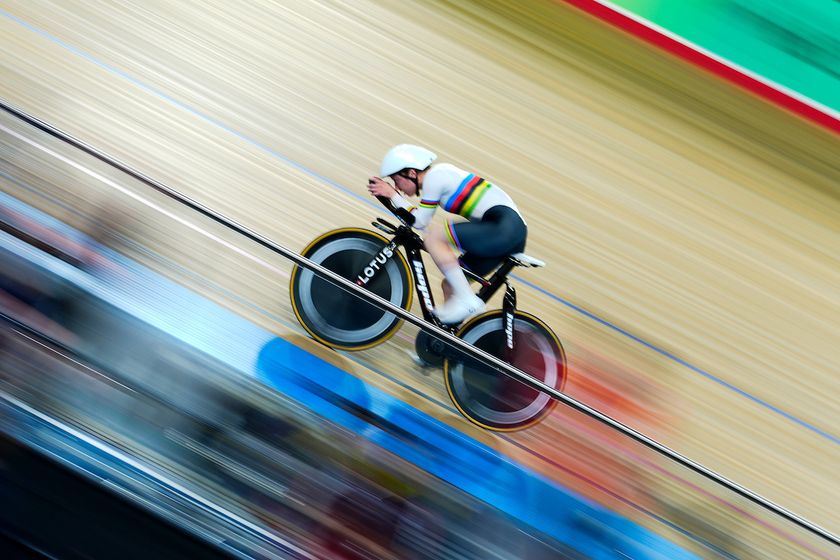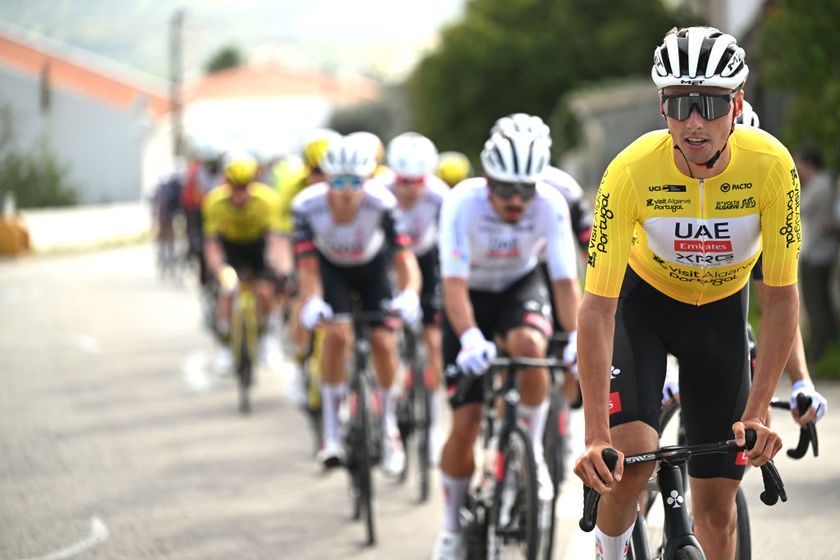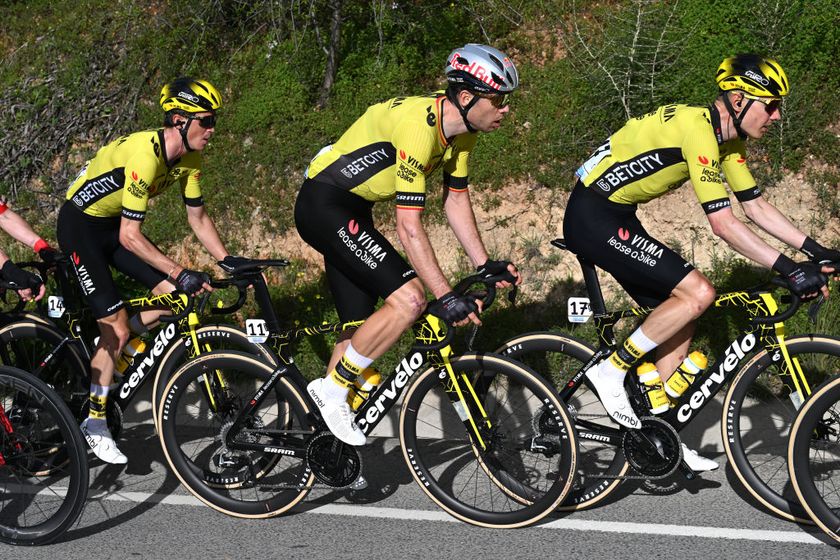Q&A: Vaughters on Tour selection policy
AIGCP President and ASO work towards enhanced professionalism




In a meeting with Amaury Sports Organisation (ASO) on Monday, AIGCP (International Association of Professional Cycling teams) president Jonathan Vaughters outlined a new proposal on how teams should be selected for the Tour de France.
While exact details of his proposal are still confidential, Vaughters confirmed that under his new criteria, ethics, results and stable sponsorship would form the pillars for Tour participation.
The current format for Tour de France selection is based on a system of automatic selection and wild cards. However, a contract signed by 18 ProTour teams in 2008, which guaranteed automatic selection, will expire after this year's edition of the race.
Cyclingnews: Can you tell us about the meeting and who was there?
Jonathan Vaughters: It was an intense, but productive meeting with the management of the ASO. I expressed the perspective of the teams in regards to participation of races, how we feel the rules should work and how we feel the future of cycling should work.
Additionally, we discussed how teams and ASO can be more co-operative in a business sense and quite frankly how to move cycling into the real world. Right now it’s not at the same level of professionalism as American football or European soccer. Bringing it just a step closer to being a real business with strong stakeholders, and a more defined system of how everything works in the sport would be my objective.
It’s very confusing to say to the broader public who the best rider in the world or who the best team in the world is, and who gets into the Tour de France and who doesn't. Try to explain it to your mother sometime - you'll see what I mean, very quickly. It's all open to debate and no one really understands the answer. It’s good if we can define those things and make the sport more appealing to a broader fan base.
Get The Leadout Newsletter
The latest race content, interviews, features, reviews and expert buying guides, direct to your inbox!
Having teams and team brands remain stable helps develop a long term fan base, just as you have in baseball or football. Players come and go, but folks are still Yankees fans. We are missing that in cycling and it limits our progress, de-stabilises athletes, and puts us at greater risk for various problems.
CN: What are you views on Tour de France selection?
Vaughters: [At the meeting] I gave my viewpoint, both personal and professional, but the point is it needs to be clarified and clear and there need to be stakeholders, meaning: ASO, the International Cycling Union (UCI) and the teams. They should all agree on how this functions and define it clearly.
Not everyone is going to be happy; in the end no one group is going to be completely happy, but that’s how compromise works. The point is that we find something to agree on and that the system is clarified and we move forward with it – that it becomes an understandable system.
CN: What is the current system for selection though, especially wild cards? Vacansoleil missed out this year and they’ve arguably had more success than teams like RadioShack, BMC Racing Team, Omega Pharma-Lotto, Euskatel-Euskadi and Lampre-Farnese Vini?
Vaughters: Right now the system was based on a contract signed two or three years ago by the ASO and the 18 teams that were ProTour. At that point in time and it was a contract that guaranteed their participation. It was signed by Patrice Clerc who is no longer with ASO. Two of those teams, Credit Agricole and Gerolsteiner, no longer exist and [this year] the rest of the selection was open and determined by ASO.
CN: What was the proposal that you put forward?
Vaughters: I shouldn’t get into specifics. It’s still confidential and it hasn’t been accepted by anyone - by the UCI or ASO - but it’s a proposal and I’ve talked to everyone from Bob Stapleton, to Patrick Lefevere, to Dave Brailsford and even smaller teams like Skil-Shimano, and they all see it at as a positive system. I think it’s a fair way forward, makes good business sense, but still keeps alive the traditions of the sport, and the big and small teams. But the specifics have to remain confidential for now.
CN: Can you tell us if it goes on a ranking or wild card system or a mixture of both?
Vaughters: No. Not yet. Again, it hasn’t been accepted by anyone. I’m trying, little by little to put the team’s interests into the equation because in the past some negotiations have occurred without much representation from teams and I just think that we should at least have a voice in the process.
We represent over $200 million in annual revenue and some 1,000 jobs. No other group in cycling is this big, but when it comes down to negotiating out the details related to how cycling's future looks, the teams have historically had little say. That has to change, if we intend to compete with other professional, international sports as a whole.
CN: If your proposal had been put in place for this year’s selection would we have had a different line-up at the Tour?
Vaughters: I don’t think it would be significantly different. It’s just a system that gives a little bit more opportunity for teams to look for long term investors and gives the Tour a more stable group to work with. The Tour needs to trust the teams and the teams should give the Tour everything they need to trust them.
That’s an important part - you can’t be business partners with someone if you don’t have mutual trust. There needs to be mutual trust and benefit on both sides of the equation.
CN: Is the Tour line up this year fair and correct from an ethical standpoint?
Vaughters: There are so many teams that the Tour was faced with a really difficult situation. The contract from 2008 aside, there were so many new teams that the market was flooded and I think it’s hard, but I think they went about it as objectively as they could have. I really wouldn’t want to be in their shoes. Their decisions were very difficult ones to make.
CN: The obvious cases are Footon-Servetto, which has had problems in the past, Caisse d'Epargne, with the ongoing Valverde situation, and the recent Lampre-Farnese Vini investigation in Italy. Then you have teams like Vacansoleil that go out of their way to sign riders who are arguably the future of the sport and they miss out.
Vaughters: At the end of the day the contract that ASO signed in 2008 had to be respected. Hopefully as things go forward in cycling the teams are able to give great transparency to all organisers. Organisers can then make decisions based on fact, reality and science, and therefore they will have enough objective information and can then make the correct decisions.
CN: Is that the answer to the question before on what the parameters would be under your proposal - science in the form of testing and biological passports, ethics in rider integrity, and organisation in the form of stable finances?
Vaughters: Personally, the ethical quality of a team is paramount so that’s extremely important. And the key to that is not what the past contains, but what a team is actively doing to keep doping risks out of their present and future.
You’ve got a triumvirate of things that should determine a team's ability to garner entry into top events and the ProTour: the ethical quality of the team, the sporting quality of the team, and then the quality of the administration of the team, for instance, stable sponsors and regular payment of everyone's wage. That's a pretty important aspect, if we're to be taken as serious businesses.
If those three things are all in place in a team at the very, very highest level then I think the team should do the Tour and be in the ProTour. If something’s out of place, even something small, then the decision becomes more difficult.
We’ve got the governing body, the UCI, then the large race organisers, like ASO, RCS... they each have their ideas on how future participation regulations should work, and what the standards should be that determine this. Therefore, I’m giving them what the position of the majority of the teams is on this topic.
I don’t expect our proposal to be liked by everyone or just go through unadjusted by ASO, UCI, or other interested parties. They equally have a strong voice but I just want it to be clear that the teams have a stake going forward and that this cannot be decided without the largest financial stakeholder in professional cycling, the teams, having a voice.
CN: You’re a manager of a team and have this stakeholder position in a sense. Isn't that a conflict of interest?
Vaughters: Of course it’s tricky. Sometimes I think if I raise the ProTour of participation standards so high, my team isn't going to make the cut. We’re not anywhere close to the highest budget team and we’re not the team with the best results. Despite this, I’m always trying to push the bar higher so it’s harder to enter to ProTour, as I think that’s the way the sport moves forward. The bar should be high and it should be very difficult to get in.
Sometimes I think that if I push it too high my team doesn’t get in, but the bar needs to be pushed up for the better of everyone and I hope that our team will rise to the occasion. At the end of the day, I’m the president of the AIGCP and I’m looking out for all the teams and the sport in general. The bar needs to go higher and higher. It’s hard to compartmentalise the two but I have to do it, if I'm to do this job correctly.
CN: If a team loses out from your proposal and your team doesn't the other could, in theory, turn around and say, 'Well of course Vaughters' team gets through, he’s the president of the AIGCP and a team manager.' There is an ethical dilemma there.
Vaughters: Yep. That’s true and eventually as the sport becomes more and more professional there will be a need for the teams to have a president that’s elected, like me, but in addition will be a full time manager that's hired by the teams and is not employed by any one team.
You’re right, I can only separate the interests to a degree. So, someone in charge of this body, but with no team affiliation, is something that needs to occur in the future for professional cycling.
Daniel Benson was the Editor in Chief at Cyclingnews.com between 2008 and 2022. Based in the UK, he joined the Cyclingnews team in 2008 as the site's first UK-based Managing Editor. In that time, he reported on over a dozen editions of the Tour de France, several World Championships, the Tour Down Under, Spring Classics, and the London 2012 Olympic Games. With the help of the excellent editorial team, he ran the coverage on Cyclingnews and has interviewed leading figures in the sport including UCI Presidents and Tour de France winners.
Most Popular




